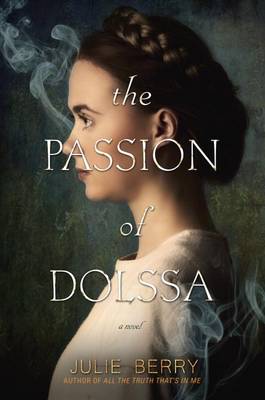
Bianca
What they don’t understand, they destroy.
— I’m not really into historical fiction, more so if it involves religious elements, but this was a really engrossing, powerful and terrifyingly real book about 13th century inquisition.

Bookhype may earn a small commission from qualifying purchases. Full disclosure.
Dolssa, a young gentlewoman from the city, is on the run from a rogue monk who wants to burn her as a heretic for her beliefs. Botille, a scrappy and charismatic peasant, is a matchmaker running a tavern with her two sisters in a tiny seaside village. When the matchmaker finds the mystic, half dead beside a country road, she takes Dolssa in and discovers the girl's extraordinary power to heal people. But the monk who pursues Dolssa will stop at nothing to find his heretic and see her burn, and the more Dolssa becomes a part of Botille's family, the graver the danger becomes for the entire village. From the author of the award-winning All the Truth That's in Me comes a spellbinding tale that will keep you on the edge of your seat and make you wonder if miracles really are possible.

What they don’t understand, they destroy.

I am not the biggest fan of religious books, so I was wary for sure. But this isn't just religion, it's history, so I figured I stood a chance. Obviously, this story stems from true events: The Crusades and religious persecution in the 13th century. And even though I am not a fan of religious stuff, I sure as hell stand by everyone else's right to believe in whatever they please. So if Dolssa wants to chat it up with Jesus on the regular, who am I to tell her not to? More importantly, who are these friars who want her to die because of it? There's a bit about miracles and such too, which also didn't really bother me, because really, who wouldn't like a miracle? Basically, the book isn't preachy at all, it's just historical.
I liked that it showed the positive and negative sides to the church. Dolssa was just trying to be peaceful and worship and maybe help some people out in the process. But these friars and other church leaders... they were gross, as a whole.
"'Oh, no,' said Bishop Raimon. 'An execution is never wasted.' He chuckled. 'Attendance at mass soars after a burning.'".
So yeah, they were awful. Not to mention how many people had already died in the name of religion during the Crusades.
The Story Structure
So far, things have been pretty positive, right? Okay, well here's where I struggled: This book is long. And I don't just mean in page length, it feels long. There are parts that seemed to drag a lot. I also think that the section heading in the ARC confused me a bit, because they didn't have the page numbers (for good reason of course; as it is an ARC they wouldn't know the exact page numbers) but still, it threw me off, and I'll show you why. Here's the ARC and the finished copy, respectively: (SEE POST FOR IMAGES
As you can see, Part III was 420 pages. But I didn't know that, and since Parts I & II were so incredibly short, I think it seemed even longer.
The good news is, the whole thing was broken up into different POVs. The bad news was that I didn't really care at all about the friars' POVs. Like, I couldn't stand them, and frankly the main friar guy was boring. I found myself skimming his parts even when I didn't mean to. And even Dolssa's seemed monotonous. It was basically just about her and Jesus, and great, I already got that, thanks for the reminder. The non-Botille POVs were just so, so dry.
I feel like I would have liked this story more if it was straight up Botille, and then maybe Dolssa in her role as the mystical escapee, but just more of Botille and her friends, family, and community. I was so interested in their lives, even the historical parts, but the other stuff just brought the flow to a halt and took me out of the story. I am still really glad I read the book, and would recommend it, but if you are not into history at all, it might not be for you.
But if a story like this sounds like your cup of tea, The Passion of Dolssa will provide a beautiful and hauntingly somber tale of two young women's paths crossing, the history that led them there, and how they changed a small city by the sea.
**Copy provided by publisher for review
